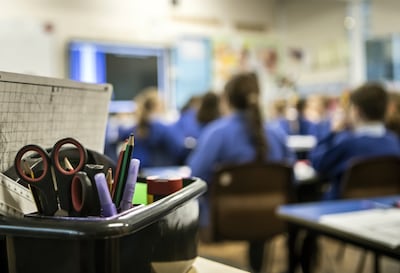Secondary school pupils in Germany recorded lower IQ levels during the pandemic, a study has found.
Researchers analysed results from the Berlin Structure of Intelligence Test, used to identify IQ levels, from pupils in grades 7 to 9 conducted in 2002, 2012 and 2020. The tests include assessments of processing speed, memory, numeracy and communication.
The study, conducted by two German universities and published by Public Library of Science on Thursday, found pupils tested during the pandemic recorded IQ scores that were 7.62 points lower than those in 2002.
Researchers said disrupted lessons due to the nation's lockdown measures and other "pandemic side effects", such as anxiety and social isolation, may have contributed to the reduction.
Researchers wrote: "Intelligence test results were lower in the pandemic 2020 sample than in the pre-pandemic 2002 and 2012 samples.
"The difference in test scores was remarkably large. It may be the case that the student population was hit particularly hard by the pandemic, having to deal with both the disruption of regular schooling and other side effects of the pandemic, such as stress, anxiety and social isolation."
The pandemic has caused widespread disruptions to education worldwide with schools closing for weeks or months, classes being moved online or only a selection of pupils being able to receive an education at any one time.
The impact of the pandemic on intelligence test performance has practical implications, such as the need for educational compensatory measures and the consideration of pandemic-related consequences in post-pandemic intelligence assessments.
The findings are concerning for pupils affected by prolonged school closures and irregular attendance, with fears of an increased number of dropouts and reduced graduation rates in secondary education.

The effect of the pandemic on intelligence levels is difficult to quantify, but a lower quality of teaching by remote learning and reduced time investment in education over many months may still be observed in research.
The study, conducted in the Rhineland-Palatinate state, describes the measures taken in schools during the first and second waves of the pandemic and highlights the effects of these measures on pupils' emotional and academic well-being.
The disruption of education and uncertainty about the pandemic have taken a toll on pupils' mental health, according to the study. Psychologists and teachers have also warned of severe learning losses, with pupils reporting spending only half their usual time on educational activities.
The constant stream of news about the pandemic, increased tension at home and loss of social contact with peers have led to mind wandering and worrying, which can impair cognitive performance, experts warned.

The research highlights the need for ongoing support for pupils to address the negative effects of the pandemic on their academic and emotional well-being.
The Covid-19 pandemic and associated measures have led to a decrease in academic achievement in pupils globally, with simulations predicting a total learning loss of up to 1.1 school years, worth approximately $10 trillion.
Educational institutions can play a critical role in mitigating the long-term effects of the pandemic on academic development, according to the report. Additionally, intelligence testing practices may need to be updated to account for the pandemic's impact on test performance. However, further research is needed to confirm the study's findings and investigate differences between pre-pandemic and current pupil samples to adjust for any negative effects.

